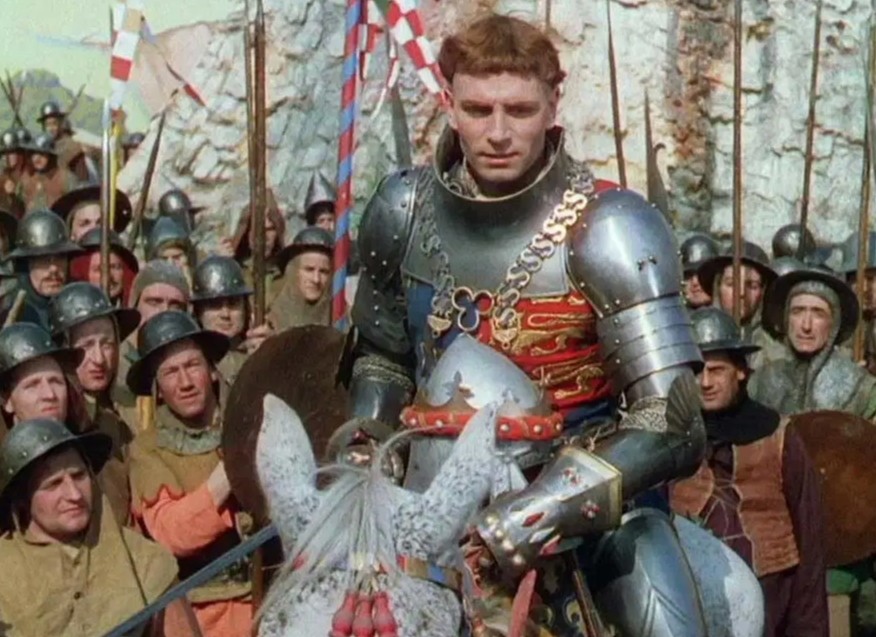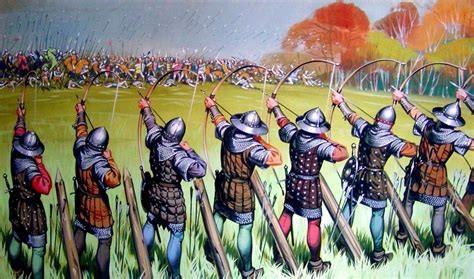
Today, 25th October, is St. Crispin’s Day, the feast day of the Christian saints Crispin and Crispinian, twins martyred c. 286. They are the patron saints of cobblers, leather workers, tanners, saddlers and glove, lace and shoemakers, who traditionally had a day off and celebrated St Crispin’s Day with much merrymaking. Newspapers often published stories of shoemakers ‘on the drink’ and an old rhyme ran:
The twenty-fifth of October,
More Snobs drunk than sober.
But 609 years ago, a battle in France played a central role in creating the emerging English identity, now under so much threat. On October 25, 1415, a beleaguered English army, tired, hungry, and wracked with dysentery, encountered a much larger French army of well-armoured knights and footmen.
The English, mostly infantry and archers, were cornered. There was nowhere they could run. But they stood defiant. They drove stakes into the ground and waited for the French to engage. The French were sure of victory and their morale was high.
In 1414, King Henry V invaded France in continuation of the Hundred Years’ War, in which the throne of France was in dispute between two royal houses. The House of Plantagenet, which ruled over England and its territories, claimed the throne on which the House of Valois sat.
The invasion began with about 12,000 men, led by King Henry V himself, and was in high spirits as they began their first engagement by besieging the port city of Harfleur. Although Harfleur finally fell, the siege was lengthy and costly. The lack of sanitation brought dysentery and a quarter of the English army was lost to the malaise. Henry then decided to march to Calais, the English stronghold in northern France.
Meanwhile, the French had raised a large army, which blocked the River Somme and forced the English to march eastwards, upriver. They managed to cross but were shadowed and eventually blocked from further progress on a stretch of farmland between two forested areas and the towns of Tramacourt and Agincourt, where the Battle of Agincourt would be fought.
The English had marched 260 miles in two weeks and were suffering from disease and exhaustion. They were almost out of food. The longer they waited, the more reinforcements joined the French army under the command of Constable Charles d’Albret and Marshal Boucicaut.
On the night of October 24, both armies camped on open ground, within earshot of each other. The mood in each camp, however, was very different. The French, confident of victory, were in high spirits, while the English were ordered to silence and watch for any French raids during the night, one of which was easily beaten back. Henry V and his aides prayed for rain during the night, and their prayers were answered, something that would make a significant difference, turning the ground muddy and unsuitable for cavalry.
The armies assembled on the morning of October 25. The English army consisted of about 7,000 archers and 1,500 men-at-arms and dismounted knights. The archers drove stakes (palings) into the ground in front of them to protect themselves from cavalry attacks and took up the flanks, while the men-at-arms formed the centre, standing shoulder to shoulder, four ranks deep. Units of archers also formed up at regular intervals between the men-at-arms.
The French had at least 14,000 to 15,000 men plus about 10,000 armed servants. The width of the battlefield played an important part in French deployment, their front line consisting of tightly packed dismounted knights and men-at-arms. There was little space for archers or other troops on the flanks, though a line of archers and crossbowmen were kept in the rear. On each flank, a force of about 750 mounted knights was formed.
For several hours the two armies held their positions and waited for each other to make the first move. Eventually, Henry took the initiative and began the Battle of Agincourt by advancing a group of a few hundred bowmen through the forest up the English right flank. This was risky, but they managed to get within range of the French undetected. Meanwhile, the English line uprooted their palings and advanced towards the French army. The king then gave the order for the bowmen in the forest to open fire and for the rest of the army to halt and prepare defences.

The mounted knights on the French left flank received volleys of arrows from the bowmen in the forest and, together with the knights on the opposite flank, charged the English lines while the French men-at-arms began their advance. Henry then gave the order for the rest of the archers to open fire, and the sky went black as English arrows blocked out the sun, raining death and destruction upon the French knights and their horses struggling through thick mud, the same Somme mud made famous by the descendants of Henry’s army 501 years later, turned into a quagmire by the rain.
The French cavalry broke and fled through the French lines, breaking the cohesion of the French men-at-arms. Despite the disruption to their formation however, part of the French front line hit the English hard. The fighting was fierce and desperate. Even Henry took up his sword and joined the fray. The French numbers, however, worked against them, and the rear and flanks of the French vanguard an unmissable target for the English bowmen, who sent volley after volley into their ranks.
The arrival of the second line of French men-at-arms caused further problems. The push from the rear failed to break the English lines, and the mud took its toll, with men in heavy plate armour slipping and falling in the deep mud, unable to get up once they fell.
When the storm of arrows subsided, the bowmen downed their bows and, armed with axes, knives, swords and hammers, got stuck into the flailing French. Surrounded and exhausted, many French surrendered, and many hundreds were taken prisoner. Fearing that the huge number of prisoners would pose a threat, Henry V ordered them to be executed. High-born nobles were mercilessly and ignominiously dispatched by peasants - a gross violation of the codes of chivalry of the day.
Henry sent a herald to the rest of the French army, informing them that the same fate awaited them, as the English were in no position to care for prisoners. With the horror unfolding before them, the French retired from the battlefield and left the English to their victory.
The Battle of Agincourt was a desperate but decisive struggle against the odds for the English. A combination of clever tactics and fortuitous weather worked in their favour. For the French, Agincourt was one of an inexplicable series of unfortunate defeats, what should have been a simple and easy victory turned into a disaster of monumental proportions.
The casualty rate was completely lopsided. The English lost around 600 men, the French around 6,000. Among the dead were the English Duke of York and the French commander Charles d’Albret. Boucicaut was taken prisoner and died years later in an English prison.
The victory at the Battle of Agincourt allowed Henry and his army to reach the safety of Calais. Henry V returned to France in the following years to conquer Normandy.
During the Hundred Years’ War, England and its allies won many decisive battles against the French such as at Poitiers, Crécy, and many others. However, the Battle of Agincourt is the most celebrated in terms of its effect on English national identity. Not only was it a triumph against their national enemy, but it was a triumph of the peasants over the nobility. Armed with their longbows, poor soldiers decimated the pride of the French nobility in all its arrogance, rewriting the rules of medieval warfare in the process, overturning the chivalric codes of treating nobles with clemency and respect.
Where it is remembered, Agincourt is so through Shakespeare, who, in his play Henry V, used poetic license to further enhance the sense of patriotism among his English audience, by putting the following words in Henry’s mouth, words which still stir the soul of patriotic Englishmen and women, words which we need to heed today, in an even greater hour of peril:
“Once more unto the breach, dear friends, once more;
Or close the wall up with our English dead.
In peace there's nothing so becomes a man
As modest stillness and humility:
But when the blast of war blows in our ears,
Then imitate the action of the tiger;
Stiffen the sinews, summon up the blood,
Disguise fair nature with hard-favour'd rage;
Then lend the eye a terrible aspect;
Let pry through the portage of the head
Like the brass cannon; let the brow o'erwhelm it
As fearfully as doth a galled rock
O'erhang and jutty his confounded base,
Swill'd with the wild and wasteful ocean.
Now set the teeth and stretch the nostril wide,
Hold hard the breath and bend up every spirit
To his full height. On, on, you noblest English.
Whose blood is fet from fathers of war-proof!
Fathers that, like so many Alexanders,
Have in these parts from morn till even fought
And sheathed their swords for lack of argument:
Dishonour not your mothers; now attest
That those whom you call'd fathers did beget you.
Be copy now to men of grosser blood,
And teach them how to war. And you, good yeoman,
Whose limbs were made in England, show us here
The mettle of your pasture; let us swear
That you are worth your breeding; which I doubt not;
For there is none of you so mean and base,
That hath not noble lustre in your eyes.
I see you stand like greyhounds in the slips,
Straining upon the start. The game's afoot:
Follow your spirit, and upon this charge
Cry 'God for Harry, England, and Saint George!'
It’s time again to stiffen the sinews and summon up the blood, for once more the blast of war blows in our ears. I’m not sure that the Cry for Charlie’ will have much resonance, but for England, and Saint George does- and let’s have at the enemy, the woke globalist enemy that is busy destroying all our fathers fought for and which we hold dear.